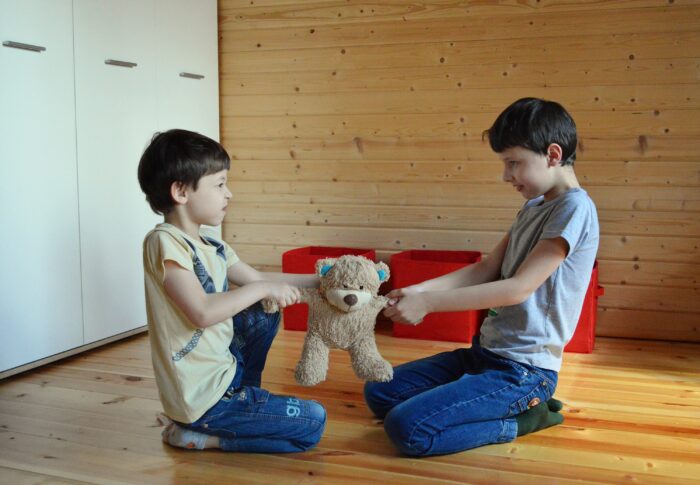
From the other room, I could hear my children bickering back and forth. Then one raised their voice, and the other one started shrieking a string of unkind words in a tone that hurt my mama’s heart.
If you have more than one child, you’re probably no stranger to sibling conflict. It’s something you also most likely deal with on a daily basis.
I know that when my kids fight, it wears on me. When they can’t get along, I start second guessing if I’m working hard enough to create a loving home for them.
And too often I’ve resorted to the extremes of either over-reacting, or ignoring the fighting completely.
As moms, we desperately want our our families to be happy and thriving. Yet with the mix of personalities, opinions and desires all under one roof, conflict between siblings is inevitable.
Sadly, fighting seems as natural to siblings as breathing. But that doesn’t mean we as parents are powerless to change it.
We can’t control our kids’ behavior entirely, but we can set better expectations and put certain things in place that make it more attractive to do the right thing.
With these 8 strategies, you can mediate sibling conflict and restore peace in your home!
This post contains affiliate links.

Encourage Healthy vs. Unhealthy Competition
A little competition can be healthy and constructive for kids. After all, there wouldn’t be much motivation for athletes to train hard if they weren’t going to compete against someone else. Putting in the hard work for a game or a math competition, or even a job interview someday – should all be encouraged.
But we foster unhealthy competition among our kids when we compare one child to another (in any regard), express disappointment that one of them didn’t do something like their sibling, or make an offhand comment about one kid having more in common with us.
Most kids tend to store these comparisons internally and they will find ways to make sure they’re seen and valued individually.
We should be careful to avoid comparisons in the family setting so that we’re not giving our kids a reason to want to “one up” their brother or sister solely for attention-seeking reasons.
Spend Quality Time Alone With Each Child
While there are plenty of ways to spend time together as a family, it can be harder to find one-on-one time with each child. Yet, I believe it’s one of the most important things we can do to decrease sibling rivalry.
Those targeted interactions can add up to important deposits into your child’s self-esteem bank. Getting involved in what they’re interested in is one way to show them you care.
Use this time to talk about their day or listen to anything they want to say. When there is no one else around, kids can open up with you easily and talk about their concerns.
And always end these one-on-one sessions by telling your child how much you enjoyed the time with him or her. It helps them to know that you love their presence in your life!

Apply Appropriate Discipline
Rivalry that is left unchecked can lead to arguing, fighting, and bickering between siblings and total frustration for you, the parent. Sometimes it’s appropriate to stay out of kids’ arguments so they can learn to work out problems by themselves.
However, when things escalate to the point of yelling and physical harm, it’s time to step in.
First, send your kids to separate rooms so they can cool off before addressing the problem with them. You probably won’t get anywhere while emotions are running high.
Then, discuss each child’s behavior with them separately, instead of trying to figure out who started it. This will only put your children on the defensive and make them feel like you’re targeting one over the other.
Plus, it’s just not that important. Regardless of who started the fight, it’s likely that both children exhibited bad behavior. Even if one child contributed 90% to the conflict and the other one only 10%, they still share some of the fault.
Ask each child what they did specifically that was wrong and why it was wrong. Then, prompt them to think about what motivated them to act that way. Finally, end the conversation by talking about how they could do things differently next time.
Teach Your Kids Skills To Handle Conflict
We can do a lot to help siblings cope with the tension between them. Teach them the skills needed to solve conflicts peacefully. Conflict solving includes both methods to express anger and negotiation skills.
Siblings don’t fight necessarily because they don’t love each other. It’s because they don’t know to express the anger that arises with conflict. You can tell them that the anger they feel is valid, but it’s not okay to lash out at other people.
Teach them the following techniques to express anger:
- Walk away from the scene
- Take deep breaths
- Count from 1-10
- Express their hurt in words
- Write/draw their feelings in a paper
- Punch a pillow or a stuffed toy
Some negotiation skills you can teach are taking turns, dividing tasks & objects, and trading toys so that each one benefits from their use.

Acknowledge and Empathize
Whenever a sibling fight happens and one child comes to you complaining, listen to him attentively and acknowledge all his feelings. For example, if your kids were fighting over a toy you can say, “Oh, he snatched your toy. You must be feeling mad.”
Don’t reply with comments like, “He is always mean like that” or “Stop whining.”
Instead, describe the situation like this: “I see both of you want to play with the same toy. That’s a tough situation. I’m sure you can work it out between the two of you.” And remind them of the problem-solving skills you taught them.
Encourage Kids To Take Some Space
It can be hard being a kid because they’re expected to share their space and belongings with someone else. But remember, just like adults, kids need their space too sometimes.
This is especially important when they become overwhelmed and emotional. Encourage them to take some space by going to their room or a different part of the house when they look stressed. You’ll prevent a squabble even before it starts!
Be aware of factors which are likely to cause a fight, such as hunger, irritability and tiredness. It’s a good idea to separate your kids from each other if you see one of them dealing with these variables.
Sometimes I tell my oldest, “Your sister is feeling overwhelmed about her school work. Let’s give her some space to figure it out.” This helps him to learn how to be empathetic towards his sister and understand her emotions.

Treat Them Uniquely, Instead of Equally
I believe in equality when it comes to treating children with dignity and respect, no matter how troubling their behavior seems to be.
But I don’t believe in providing for their needs equally. If one of my children needs a new pair of shoes, he gets it and his sister doesn’t.
We shouldn’t feel compelled to purchase a necessity for one kid just because we bought it for another. However, if I buy ice cream for one kiddo, I make sure her brother gets it too.
Children compare between themselves whether they are receiving everything their sibling gets – from love to possessions. They may even complain “You only listen to him”, or “You love her better”, or ”You bought an outfit for her, not for me.”
We need to convince them that we are not trying to provide equally, but according to everyone’s legitimate needs. If we always give according to their demands so they are treated exactly the same, we will never be able to keep up.
Likewise, when we insist that one child split a prize they earned with their brother or sister for the sake of “fairness”, we’re teaching all of them that hard work isn’t necessary. They will keep expecting to receive something even if they didn’t put in the effort.
We’re also missing an opportunity to teach the disappointed child how to be content and glad for their sibling. In real life, things aren’t always fair and you don’t get a trophy just for showing up.
But when our children know that their needs are always met, they feel safe and learn to be satisfied.
Dig Into What Scripture Says
Like any other sin, fighting doesn’t please God. And just like any other sinful behavior that our kids struggle with, we should be concerned enough to hope to inspire change.
Showing our kids what the Bible has to say about conflict and how to handle it can inspire a true heart change, rather than just our words alone.
Verses that speak directly to this issue such as Romans 12:10, Matthew 18:15, Ephesians 4:32, and Colossians 3:12-13 give wise counsel for navigating disagreements and addressing another person’s offenses.
Scripture also has a wealth of examples about conflicts among siblings in particular, beginning with Cain and Abel. I don’t think it’s any coincidence that these brothers were the most extreme example of rivalry-gone-wrong.
From their story, we can clearly see how the sin of pride and jealousy can fester in any relationship. And without repentance, it can be incredibly harmful to us and those we should love the most.
It’s also helpful to go through a Bible study on the topic of sibling rivalry with your kids. My Brother’s Keeper Sibling Bible Study by Not Consumed gets to the root of bickering and competition between brothers and sisters- prompting real, lasting change.
Over the course of 4 weeks, children learn God’s true purpose for siblings and families, the issues that siblings face, their responsibilities as siblings, and practical tools for resolving inevitable conflicts.
I love that this study comes in 3 different age levels, that all fit together perfectly! Each lesson has a consistent key truth, key Scripture, and central theme no matter what level your kids are working through.

Our role as parents in our children’s sibling conflict is an extremely important one. We have the duty and the ability to guide our kids when they fight into more productive, healthy behavior.
We can even decrease future rivalry. And because our kids simply don’t have the maturity to always understand the implications of sin, we have to make them clear.
So the next time we find our kids squaring up for battle, let’s make sure we’re armed with prayer, first and foremost. And let us allow the Holy Spirit to guide us in wisdom as we take intentional steps to inspire healthy relationships in our home.
May we be vigilant in helping them to see their sibling not as an enemy, but as a God-given, lifelong ally!

Leave a Reply
You must be logged in to post a comment.